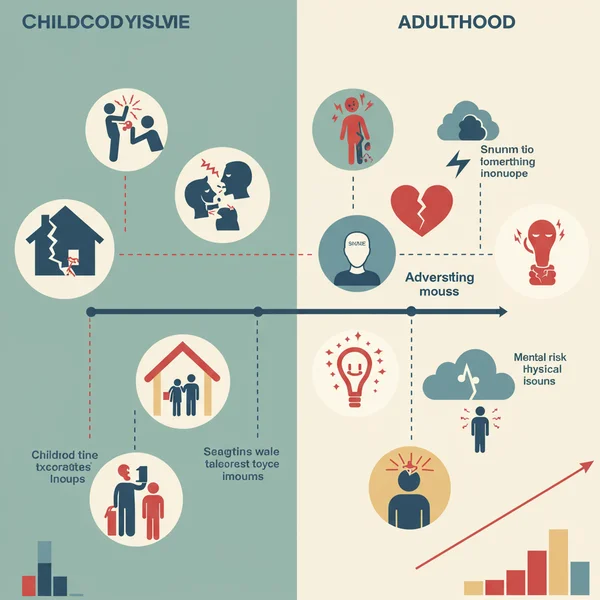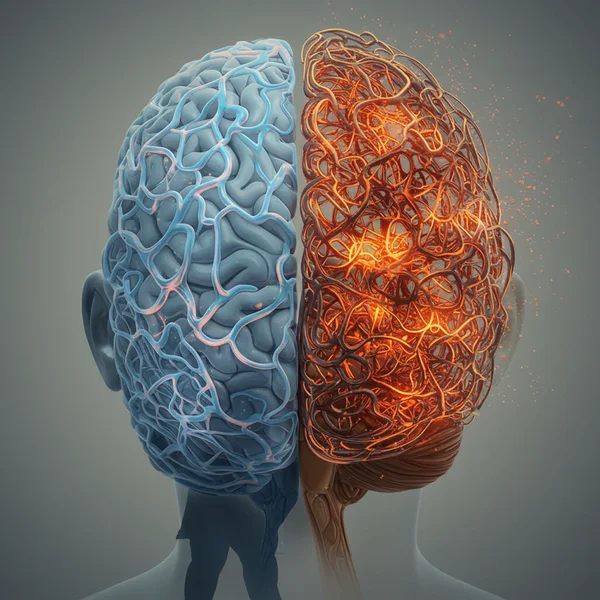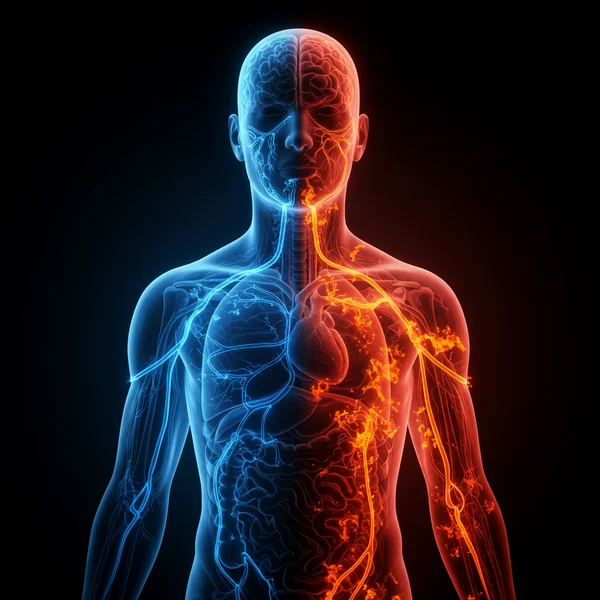ACE Score & Mental Health: Unmasking Trauma's Impact
August 4, 2025 | By Jasper Quinn
Many adults grapple with unexplained anxiety, depression, or chronic stress, often unaware of the deep roots these issues might have in their past. Have you ever wondered if your current struggles are connected to your early life? Let's explore the profound, scientifically-backed connection between your ACE Score and long-term adult mental health. We'll delve into how early adversity shapes well-being, empowering you with the knowledge needed for understanding and healing. The first step towards clarity begins with a single question: What does my ACE score mean? You can discover your ACE score on our free, confidential platform today.
Understanding Your ACE Score's Mental Health Link
The ACE test isn't just a concept; it's a powerful tool for self-discovery. It isn't about placing blame or dwelling on the past; it's about understanding the narrative of your life and how it has influenced your present. By connecting the dots between your childhood and your adult mental health, you can unlock new pathways to healing and resilience. This knowledge provides a framework for making sense of feelings and behaviors that may have seemed random or overwhelming.
The Core of Adverse Childhood Experiences (ACEs)
The original ACE study test was a groundbreaking piece of research by the Centers for Disease Control and Prevention (CDC) and Kaiser Permanente. It identified ten specific types of abuse, neglect, and household dysfunction that can have a lasting impact. These experiences include physical, emotional, or sexual abuse; physical or emotional neglect; and household challenges like witnessing domestic violence, substance abuse, mental illness, parental separation, or having an incarcerated household member. Each "yes" answer to these ten questions adds one point to your score, creating a simple yet profound metric.
What a High ACE Score Reveals About Your Well-being
A high ACE score is not a diagnosis or a life sentence. Instead, it serves as an indicator of the level of toxic stress you may have been exposed to as a child. Research shows a strong dose-response relationship between ACEs and health outcomes. This means the higher the score, the higher the risk for various mental and physical health issues in adulthood, including anxiety disorders, depression, and substance use disorders. Knowing your score is pivotal for proactive self-care and risk mitigation.

Childhood Trauma & Anxiety: The Persistent Alarm System
One of the most common consequences of childhood trauma is anxiety. If you experienced significant adversity as a child, your brain and nervous system may have adapted to a state of constant high alert. This isn't a character flaw; it's a survival mechanism that has outlived its original purpose. Your "fight, flight, or freeze" response may be easily triggered, leading to the persistent feelings of worry, dread, and hypervigilance that characterize anxiety disorders.
How Toxic Stress Rewires the Developing Brain
A toxic stress response occurs when a child experiences strong, frequent, or prolonged adversity without adequate adult support. This sustained activation of the stress response system can change the architecture of the developing brain. Areas responsible for emotional regulation, memory, and executive function can be affected. This is why you might find it difficult to calm down after a stressful event or react more intensely to perceived threats than others seem to. Recognizing this helps you approach your anxiety with compassion, not criticism.

Recognizing Anxiety Patterns Rooted in Early Experiences
Anxiety from childhood trauma can manifest in specific ways. You might experience social anxiety, fearing judgment or rejection. You might have a generalized anxiety disorder, feeling a constant, free-floating sense of unease. Panic attacks, obsessive thoughts, or a persistent fear of abandonment can also be traced back to early instability. Identifying these patterns is crucial, and the insights from a confidential ACE assessment test can provide a valuable starting point for this exploration.
ACEs & Depression: Beyond the Blues of the Past
The link between ACEs and depression is well-established and deeply felt by many. Childhood adversity can create a foundation for depressive disorders by shaping negative self-perceptions, fostering a sense of hopelessness, and altering the brain's neurochemistry. Feelings of worthlessness or chronic emptiness in adulthood often have their origins in early experiences where a child's emotional or physical needs were not consistently met. This isn't just "being sad"; it's a complex condition rooted in developmental history.
The Link Between Early Adversity and Mood Disorders
From a biological perspective, chronic childhood stress can disrupt the regulation of key neurotransmitters like serotonin and dopamine, which are crucial for mood stability. Psychologically, growing up in an unpredictable or unloving environment can lead to learned helplessness—a belief that you have no control over the negative events in your life. This combination of biological predisposition and learned psychological patterns creates a significant vulnerability for developing major depressive disorder.
Identifying Depressive Symptoms Shaped by Childhood Trauma
While common symptoms of depression include sadness and loss of interest, trauma-related depression can also involve profound feelings of shame and guilt. It might manifest as emotional numbness, a persistent feeling of being "broken," or difficulty forming secure attachments. Many people use a childhood trauma quiz as a first step to connect these feelings to their past experiences. Taking our confidential ACE test online can illuminate these connections and empower you to seek the right kind of support.

Chronic Stress from ACEs: A Silent Impact on Body & Mind
The impact of chronic stress from ACEs extends far beyond mental health, creating a profound mind-body connection that can affect your physical well-being. The toxic stress experienced in childhood doesn't just disappear; it can become embedded in our biology, leading to long-term inflammation and a dysregulated immune system. Many adults with a high ACE score report chronic health issues that doctors struggle to explain, highlighting the deep and lasting imprint of early adversity.
The Mind-Body Connection: Physical Manifestations of Stress
This chronic, low-grade activation of the body's stress response can contribute to a host of physical ailments. These include autoimmune diseases, chronic fatigue syndrome, fibromyalgia, heart disease, and frequent infections. If you've struggled with unexplained physical symptoms, understanding your ACE score could be a missing piece of the puzzle. It provides a lens through which you and your healthcare provider can view your overall health.

Navigating Relationships and Coping with Trauma's Shadow
Adverse childhood experiences fundamentally shape our "relational template"—our blueprint for how relationships work. This can make it difficult to trust others, set healthy boundaries, or feel secure in intimate partnerships. The shadow of trauma can lead to patterns of conflict, avoidance, or codependency. Beginning to understand your past is a vital step in breaking these cycles and building the healthy, supportive relationships you deserve.
Understanding Your Past, Empowering Your Future
Learning about the connection between your ACE score and mental health is not about assigning blame or being defined by your past. It is about liberation. This knowledge empowers you to understand your story, reframe your experiences, and recognize your incredible resilience. A high ACE score is not a predictor of your destiny; it is a powerful piece of information that can guide you on a path of intentional healing and growth.
Your journey of self-exploration can begin right now. By understanding the potential impact of your early years, you take the first, most crucial step toward building a healthier, richer future. Ready to gain clarity? Take the free ACE test on our secure, confidential platform and receive your score instantly.
Frequently Asked Questions About ACEs and Mental Health
What does my ACE score mean?
Your ACE score (from 0 to 10) is a measure of your exposure to ten specific types of adverse childhood experiences. It is not a grade or judgment. A higher score indicates a greater exposure to childhood adversity, which is correlated with a higher risk for certain health and well-being challenges in adulthood. Think of it as a tool for self-awareness that can help you understand your personal risk factors and strengths.
Can you recover from a high ACE score?
Absolutely. Your ACE score is not your destiny. The human brain has a remarkable capacity for change and healing, a concept known as neuroplasticity. With awareness, supportive relationships, therapeutic interventions like mindfulness and counseling, and building healthy coping mechanisms, you can actively build resilience and thrive. Many people with high ACE scores lead healthy, fulfilling, and successful lives. The key is turning awareness into action.
How to heal from childhood trauma?
Healing is indeed a deeply personal journey, yet common threads often guide the path to recovery from childhood trauma. The first step is awareness, which is where an ACE trauma test can be invaluable. Subsequent steps often include seeking professional support from a trauma-informed therapist, practicing self-compassion, developing healthy coping strategies, and building a strong support network. The goal is not to erase the past, but to integrate it into your story in a way that no longer controls your present. Taking the free ace test can be a powerful catalyst for starting this journey.